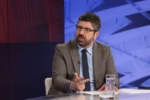Serbian President Aleksandar Vučić once again displayed his increasingly defensive and delusional attitude toward the European Union, dismissing the European Commission’s 2025 Progress Report on Serbia as nothing more than “an opinion.”
At a joint press conference with EU Ambassador Andreas von Beckeret, Vučić attempted to downplay the EU’s serious concerns about democratic backsliding, media repression, and the erosion of the rule of law in Serbia. When told the report should serve as a “mirror” reflecting the country’s progress, Vučić retorted arrogantly:
“You call it a mirror — I’d say it’s just your opinion.”
This deflection — typical of Vučić’s rhetoric — highlights his growing detachment from reality and unwillingness to face the authoritarian direction his government has taken. Instead of addressing corruption, media capture, and attacks on dissent, the president repeated his old talking points on Kosovo, claiming that Belgrade’s sovereignty there is “based on international law.”
Vučić insisted that Serbia would “continue reforms” and maintain its “European path,” yet these hollow promises stand in stark contrast to the EU’s repeated warnings about Serbia’s regression in democracy and freedom of expression. His statement that he has “bitten his tongue to speak positively about the EU” only underscored the insincerity of his pro-European claims.
EU’s Message: Reform or Lose Credibility
Ambassador Andreas von Beckeret made clear that Serbia’s EU accession is at a crossroads. The European Commission’s report, he said, is not a political attack but an honest reflection of where Serbia stands — and the picture is far from flattering.
He urged Serbia to overcome stagnation in the judiciary, restore media freedoms, and end the decline of human rights and academic independence. The EU’s message was unequivocal:
“Serbia must back its words with concrete action. The future of Serbia is in the EU — not just in words, but in deeds.”
Beckeret also stressed that relations with Kosovo and genuine alignment with EU foreign policy will determine Serbia’s credibility as a candidate state.
Analysis: Vučić’s Parallel Reality
Vučić’s remarks reveal a leader increasingly isolated from both the EU and his own citizens’ aspirations. While the EU speaks the language of reform, transparency, and democracy, Vučić responds with deflection, nationalist sentiment, and political theater.
By calling the EU’s findings “just an opinion,” Vučić signaled not confidence — but fear. Fear of accountability, fear of transparency, and fear of losing the carefully constructed illusion of control that sustains his rule.
As Serbia’s institutions weaken and democratic standards crumble, Vučić continues to present himself as both victim and savior — a delusional narrative that grows less convincing with every EU report.







